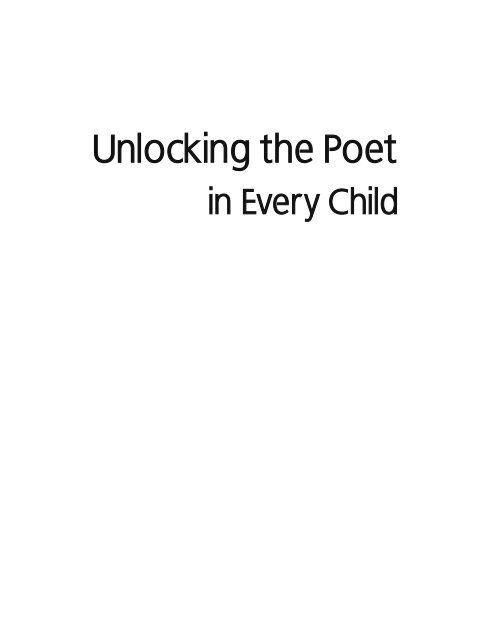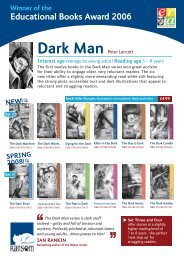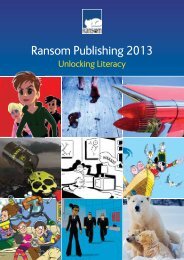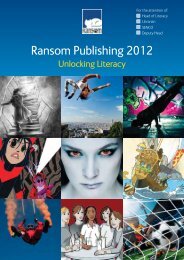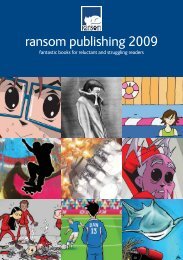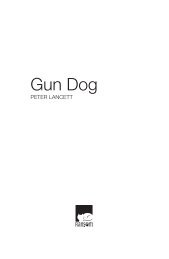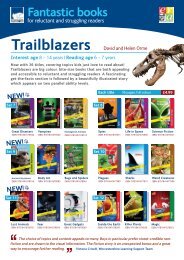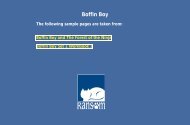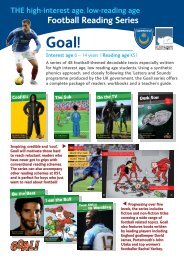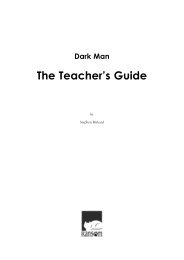Sample extract - Ransom Publishing
Sample extract - Ransom Publishing
Sample extract - Ransom Publishing
Create successful ePaper yourself
Turn your PDF publications into a flip-book with our unique Google optimized e-Paper software.
Unlocking the Poet<br />
in Every Child
About the author<br />
David Orme has written many books for children, and a wide range of<br />
materials for teachers. He has been involved for many years in running<br />
writing workshops for students and in-service training sessions for teachers.<br />
Also in this series<br />
Unlocking the Reader in Every Child<br />
978 184167 970 9<br />
Unlocking the Writer in Every Child<br />
978 184167 971 6<br />
Motivating Reluctant and Struggling Readers<br />
978 184167 975 4<br />
Susan Elkin<br />
Susan Elkin<br />
Stephen Rickard
Unlocking the Poet<br />
in Every Child<br />
Strategies, activities and resources for teaching poetry<br />
David Orme
Unlocking the Poet in Every Child<br />
by David Orme<br />
Published by <strong>Ransom</strong> <strong>Publishing</strong> Ltd.<br />
Radley House, 8 St. Cross Road, Winchester, Hants. SO23 9HX, UK<br />
www.ransom.co.uk<br />
ISBN 978 184167 969 3<br />
First published in 2011<br />
Copyright © 2011 <strong>Ransom</strong> <strong>Publishing</strong> Ltd.<br />
Text copyright © 2011 David Orme.<br />
Photographs and illustrations copyright: cover – Arman Zhenikeyev, Yucel Yilmaz, Merijn van der<br />
Vliet, Andriy Sharapa; arrows – Olena Stinska; jigsaw – derrrek; cogs, dart – Jamie Farrant; p9 –<br />
Maartje van Caspel; p19 – kali9; p21 – Nina Shannon, Jacek Chabraszewski; p28 – Ryan Burke;<br />
p33 – mediaphotos; p39 – Sadeugra; p89 – 4x6, Ju-Lee; p93 – Kathy Konkle; p165 – Darryl Sleath;<br />
p191 – Carmen Martínez Banús.<br />
‘In A Station of the Metro’ by Ezra Pound, from PERSONAE, copyright © 1926 by Ezra Pound.<br />
Reprinted by kind permission of New Directions <strong>Publishing</strong> Corp. and Faber and Faber Ltd.<br />
All rights reserved. No part of this publication may be reproduced or transmitted in any<br />
form or by any means, electronic or mechanical, including photocopying, recording, or<br />
any information storage or retrieval system, without prior permission in writing from the<br />
publishers.<br />
A CIP catalogue record of this book is available from the British Library.<br />
The right of David Orme to be identified as the author of this Work has been asserted by<br />
him in accordance with sections 77 and 78 of the Copyright, Design and Patents Act<br />
1988.
Contents 5<br />
Contents<br />
Part One: Poetry Teaching Strategies<br />
1 Teaching Poetry in the Primary School<br />
So what is poetry anyway?<br />
Why teach poetry?<br />
Problems in teaching poetry<br />
2 Reading, Listening and Performing<br />
3 Writing<br />
4 Assessment<br />
Preparing to read a poem<br />
Performing poetry<br />
Optional extras: choreography and props<br />
The writing process<br />
Assessing writing<br />
Assessing responses to poetry<br />
Part Two: Poetry Tex t s and Activities<br />
1. Teddy bears’ picnic<br />
2. Sunbeams<br />
3. People who help us<br />
4. Bedroom pets<br />
5. Turnip poems<br />
6. How many legs?<br />
7. Animals at school<br />
8. The special zoo<br />
9. Animal alphabets and animal counting<br />
10. Simple similes<br />
11. Getting to school<br />
12. Festive counting<br />
13. First person writing<br />
14. I like lists!<br />
15. Refrains and choruses<br />
16. Spider plants and goldfish<br />
17. Recipes<br />
9<br />
10<br />
10<br />
11<br />
14<br />
17<br />
18<br />
19<br />
22<br />
24<br />
25<br />
35<br />
35<br />
36<br />
39<br />
42<br />
44<br />
46<br />
48<br />
50<br />
52<br />
54<br />
56<br />
58<br />
60<br />
62<br />
64<br />
66<br />
68<br />
70<br />
72<br />
74
6<br />
Unlocking the Poet in Every Child<br />
18. Letter poems<br />
19. Wishing poems (streamers)<br />
20. Now I’m six<br />
21. Acrostics<br />
22. Rainy day thesaurus<br />
23. We hate boring verbs<br />
24. Shape poems<br />
25. Action poems<br />
26. One-letter poems, one-word poems<br />
27. Silly bubbles<br />
28. Onomatopoems<br />
29. Being things<br />
30. Elemental brainstorming<br />
31. Growing – and shrinking<br />
32. Feelings zoo<br />
33. Objects<br />
34. Simple riddles<br />
35. Kennings<br />
36. Metaphor poems<br />
37. Onset poems<br />
38. Colour poems<br />
39. Subjunctive poems<br />
40. Sound poems<br />
41. Telling stories – anecdotes<br />
42. Horribly thin poems<br />
43. Past, present and future poems<br />
44. Preposition poems<br />
45. Participles<br />
46. Opposites<br />
47. Dialogue poems<br />
48. Rhyme and all that nonsense<br />
49. Rhythms and raps<br />
50. Extreme rhyme – qasidah<br />
51. Limericks<br />
52. Question and answer<br />
53. Question and answer (If it wasn’t ...)<br />
54. More challenging riddles<br />
55. Ezras<br />
56. Haiku<br />
57. Tanka<br />
76<br />
78<br />
80<br />
82<br />
84<br />
86<br />
88<br />
90<br />
92<br />
94<br />
96<br />
98<br />
100<br />
102<br />
104<br />
106<br />
108<br />
110<br />
112<br />
114<br />
116<br />
118<br />
120<br />
122<br />
124<br />
126<br />
128<br />
130<br />
132<br />
134<br />
136<br />
138<br />
140<br />
142<br />
144<br />
146<br />
148<br />
150<br />
152<br />
154
Contents 7<br />
Part Three: Anthology<br />
58. Cinquains<br />
59. Iambics<br />
60. Ballads<br />
61. Sonnets and half-sonnets<br />
Anthology contents: List of poems<br />
Counting poems<br />
1. Who’s counting?<br />
2. Ten weary teachers<br />
3. A hot day on Mercury<br />
Recipe poems<br />
4. The goblin’s Christmas pud<br />
First person poems<br />
5. Earth<br />
6. Fireweed in the park<br />
Question and answer poems<br />
7. Dear Man in the Moon<br />
Metaphor and simile<br />
8. Hi Mr Fly<br />
9. Bandits at half past three<br />
10. Earwig<br />
11. Going batty<br />
Personification<br />
12. Phew! What a scorcher!<br />
Alliteration<br />
13. Pool people<br />
Riddles<br />
14. Punch lines<br />
15. Taking your money<br />
Free verse<br />
16. Art lesson<br />
Subjunctive poems<br />
17. If I were the sun<br />
Rhyme and rhythm<br />
18. Keep on scratching<br />
19. Not many rhymes for Pluto<br />
20. Let’s hear it for Dr. Catastrophe’s<br />
amazing talking fish<br />
21. Jack McHat<br />
156<br />
158<br />
160<br />
162<br />
165<br />
166<br />
168<br />
168<br />
168<br />
170<br />
170<br />
170<br />
171<br />
171<br />
172<br />
172<br />
172<br />
173<br />
173<br />
174<br />
175<br />
175<br />
176<br />
176<br />
176<br />
176<br />
177<br />
177<br />
178<br />
178<br />
178<br />
179<br />
179<br />
180<br />
180<br />
180<br />
181<br />
182
8<br />
Unlocking the Poet in Every Child<br />
Appendices<br />
22. Gossip<br />
Refrains<br />
23. A hard life without ease<br />
Ballads<br />
24. Eddy Scott goes out to play<br />
Poems in dialogue<br />
25. First dog on the Moon<br />
Haiku<br />
26. Mystery haiku<br />
Tanka<br />
27. Hay fever<br />
28. Oil tanka<br />
Cinquains<br />
29. January<br />
Sonnets<br />
30. On the late night massacre in Putney<br />
31. Hot stuff<br />
And one final poem ...<br />
32. Imagination<br />
Glossary of terms used in poetry<br />
Index of anthology first lines<br />
182<br />
183<br />
183<br />
184<br />
184<br />
186<br />
186<br />
187<br />
187<br />
187<br />
187<br />
188<br />
188<br />
188<br />
188<br />
188<br />
189<br />
189<br />
189<br />
191<br />
192<br />
198
Part One<br />
Poetry Teaching<br />
1Strategies
10 Unlocking the Poet in Every Child<br />
1<br />
Primary Poetry:<br />
Strategies for Teaching Poetry<br />
in the Primary School<br />
So what is poetry anyway?<br />
Poetry is patterned language, a putting together of words and images to<br />
create an effect that is emotional, intellectual and musical. The best poems<br />
balance these three elements.<br />
A special way of looking<br />
This <strong>extract</strong> from William Blake’s poem Auguries of Innocence is a perfect<br />
account of the way a poet works:<br />
To see a world in a grain of sand<br />
And Heaven in a wild flower,<br />
Hold infinity in the palm of your hand<br />
And eternity in an hour.
Poetry Teaching Strategies<br />
11<br />
We all observe the world, but the poet sees more. The poet sees the<br />
implications of ordinary things. It could be a burglar rattling at the door, the<br />
ghost of a lost soul seeking<br />
revenge, or a fire-breathing<br />
dragon knocking over dustbins<br />
with its tail and ripping leaves<br />
from trees with its breath.<br />
The ability to look in this<br />
special way is inherent in<br />
children’s imagination, and<br />
needs only to be encouraged.<br />
Children rely on imagination as<br />
A windy day is just<br />
‘weather’, but for the poet<br />
the wind can be wildly and<br />
violently alive.<br />
a survival mechanism in a complex and unpredictable world, and are rather<br />
better at finding these sorts of images than worldly-wise adults.<br />
For children, this ‘special way of looking’ encourages depth of thought,<br />
sideways thinking and an ability to make links between apparently disparate<br />
ideas.<br />
Why teach poetry?<br />
Poetry provides a huge variety of models for writing. It also provides<br />
opportunities to consider grammar and punctuation in action, and to widen<br />
vocabulary. It supports many other aspects of literacy by making links with<br />
other curriculum areas, exploring points of view and justifying opinions. For<br />
students still insecure with reading, it offers repetition and memorability.<br />
Structured work in poetry can solve some of the problems associated<br />
with a broad curriculum and limited time.<br />
Poetry is, in my view, the finest way of all of<br />
developing a ‘feel’ for how language works.<br />
Whatever the writing task, a background in poetry<br />
will make the writing more cogent and more<br />
persuasive.
12 Unlocking the Poet in Every Child<br />
Avoiding agendas<br />
Poetry doesn’t have to be limited to literacy lessons – it can have an impact<br />
across the entire curriculum. There is a danger, however, that it can be<br />
hijacked to address other agendas. Teachers concerned with PSHE (personal,<br />
social and health education) issues, for instance, may use a poem to introduce<br />
a topic – the environment, or issues of gender, for example – and then close<br />
the poetry anthology and move smartly on to discuss the issue.<br />
This approach ignores the important point that the poet will have views<br />
and insights into the topic that deserve to be heard and explored, and if the<br />
poem is simply used as a ‘warm-up’ exercise these will be lost.<br />
Poetry can inform work in history, or geography –<br />
in fact just about anything. But choose the poem<br />
carefully, give it due attention, and get full value out<br />
of it.<br />
Delight in language<br />
Children love the ‘wit’ of<br />
language: jokes, riddles, silly<br />
rhymes, playground chants<br />
and games. Much of this is<br />
unsophisticated to adults,<br />
but playing with language in<br />
these informal ways builds<br />
confidence.<br />
‘Failing’ children because<br />
of inaccuracies, or trying to<br />
formalise their writing at too<br />
early an age, can destroy<br />
children’s confidence.<br />
Word games, both written and oral, where ‘anything goes’, are an essential<br />
first step in moving towards being able to use language in a formal, controlled<br />
way. Poetry provides the fun and the framework for these games.<br />
Building vocabulary and language skills<br />
Children often have a wide knowledge of words, but in general they only<br />
use a limited vocabulary in their speaking and writing. If asked for a word to<br />
describe an elephant, they will, inevitably, come up with ‘big’. A ladybird will<br />
be ‘tiny’, a leaf ‘green’, and so on.
Poetry Teaching Strategies<br />
13<br />
Because of its insistence on freshness, quirkiness<br />
and a ‘special way of looking’, poetry writing is<br />
the best way not just of building vocabulary, but also<br />
of utilising the vocabulary children already have.<br />
In the same way, reading a wide range of poetry encourages breadth of<br />
vocabulary, as poets very rarely state the obvious.<br />
Immediacy<br />
Compared with fiction, poems are short, often repetitive and have highly<br />
patterned language. These ingredients make them ideal reading for younger<br />
children still struggling with language.<br />
The impact of a poem is immediate, and the<br />
language, because of its patterning, is memorable.<br />
This memorability reinforces the process of learning to read; children will<br />
‘know’ the poem, even if struggling with reading individual words.<br />
For weaker readers, struggling to understand a sentence often means that<br />
what happened in a previous sentence is forgotten, but poetry, with its<br />
patterned language, ‘sticks’.<br />
Coping with feelings<br />
Poems start with the concrete and move to the abstract. They explore the<br />
emotional implications of objects, observations and events. The emotions are<br />
generally positive ones, such as delight and humour, but sadness is not<br />
excluded.<br />
Reading poetry can expand the ability to cope<br />
with events and give a sense of perspective.<br />
Writing poetry provides the means to express<br />
difficult feelings.
14<br />
Unlocking the Poet in Every Child<br />
Problems in teaching poetry<br />
Is poetry difficult?<br />
Teachers sometimes feel that poetry is ‘difficult’ and full of obscure<br />
techniques such as onomatopoeia and metaphor. They may also be conscious<br />
of the rather precious image poetry has had in the past, and wonder how<br />
well it will go down with a modern-day class.<br />
Poetry is difficult only if presented in an<br />
insufficiently structured and guided way.<br />
The hardest task for a child (or adult) is to be asked to sit<br />
down and write a poem on a given theme, with no help on<br />
how to go about such a task.<br />
Some teachers may feel that the introduction of ‘formal’ poetry such as<br />
a haiku or cinquain is unduly restrictive. The opposite is the truth. The<br />
structure or ‘pattern’ of the poem frees the poet from the necessity of<br />
finding a pattern of his or her own, and provides a scaffold for children<br />
struggling with abstract ideas.<br />
For any reader, reading a poem ‘cold’ can be<br />
difficult. Poems are more than just words on a<br />
page. They need to be heard, so that the music of<br />
the poem can have its effect.<br />
Sometimes children are good<br />
at letting a poem just ‘happen’<br />
without worrying about finding a<br />
key to unlock its meaning.<br />
Sometimes the ideas of a poem<br />
are straightforward, but the<br />
language is difficult because the<br />
poem is pre-twentieth century.<br />
Do not be too<br />
preoccupied with the<br />
meaning a poem has; the<br />
important focus should<br />
be on the emotional<br />
resonance of the words<br />
and sounds.
Poetry Teaching Strategies<br />
15<br />
Very often, a good performance followed by a discussion of the main<br />
thrust of the poem will overcome difficulties. Remind children that they do<br />
not need to understand every word in a poem to enjoy it. Often the very<br />
difficulty of poetry – the challenge of the ‘puzzle’ element in riddles, for<br />
example – is what children find most enjoyable.<br />
Poetry and special needs<br />
Poetry is language at its most sophisticated and intense, and so it seems<br />
counter-intuitive to argue that it is particularly appropriate for students with<br />
special needs, or for those who struggle with language or who are disaffected<br />
with the learning process. However, poetry has unique advantages when we<br />
are working with these groups:<br />
1<br />
2<br />
3<br />
Brevity<br />
Reading or writing a story can be a major challenge for children<br />
with a short attention span or those with problems with short-term<br />
memory. More often than not, poems are short – which reduces<br />
the problem.<br />
Appropriate content<br />
Children’s poems are often funny and/or subversive.<br />
Structure<br />
Struggling young writers find it difficult to get started and to<br />
structure their writing. The activities suggested in Part Two of this<br />
book provide the scaffolding to get over these problems, without<br />
restricting the more able children.<br />
I have sometimes described poetry-writing as ‘age non-specific’. For<br />
example, a haiku can be written by an eight year-old or by a sophisticated<br />
adult. The content will be different, of course, but the task is the same.<br />
Poetry-writing is an ideal activity for a mixed-ability<br />
class.
16<br />
Unlocking the Poet in Every Child<br />
Does poetry have a poor image?<br />
Poetry’s sentimental image is long gone and these days it does not occur to<br />
children that there is anything ‘soppy’ about it.<br />
Poetry and rhymes feature in everyday life,<br />
whether it be in nursery rhymes or TV jingles.<br />
There has been an explosion in children’s poetry in recent years, and much<br />
of it is funny, subversive and distinctly unsentimental. It is important, though,<br />
that children are presented with more than just ‘funny’ verse, as this will sell<br />
both them, and poetry, short.


